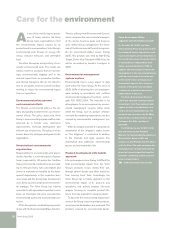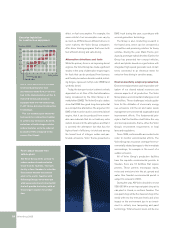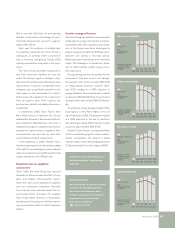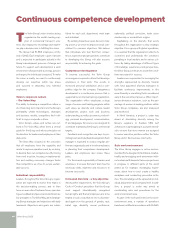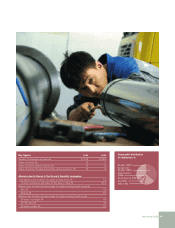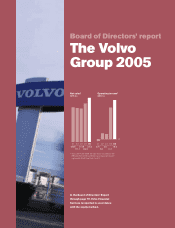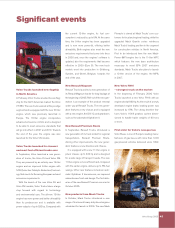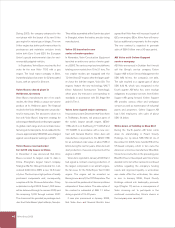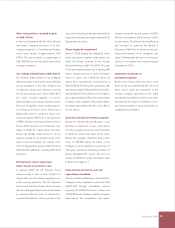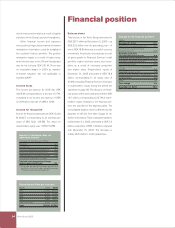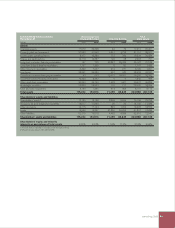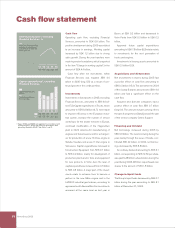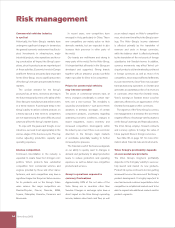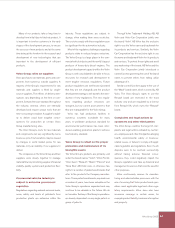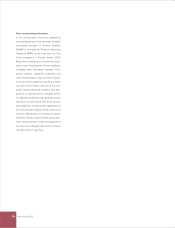Volvo 2005 Annual Report Download - page 50
Download and view the complete annual report
Please find page 50 of the 2005 Volvo annual report below. You can navigate through the pages in the report by either clicking on the pages listed below, or by using the keyword search tool below to find specific information within the annual report.
46 Volvo Group 2005
During 2005, the company advanced to the
next phase with the launch of its new 9-liter
gas engine for natural gas or biogas. The new
9-liter engine has better performance than its
predecessor and maintains emission levels
below both Euro 5 and EEV, the European
Union’s special enviro nmental class for envi-
ronmentally adap ted vehicles.
In September, Volvo Buses received its first
order for the new Volvo 7700 with a gas
engine. The local transit company in Bern,
Switzerland placed an order for 32 articulated
buses, with an option for 39 more.
Volvo Buses closed plant in
Heilbronn, Germany
Volvo Buses manufactured one of its coach
models, the Volvo 9900, a unique low-volume
product, at its Heilbronn plant. The financial
results for the Volvo 9900 had been unsatisfac-
tory for many years. The decision to close is in
line with Volvo Buses’ long-term strategy for
achieving profitability and continuing to upgrade
its global coach range and concentrate manu-
facturing at its main plants. Costs related to the
closu re , appr oxim ate ly S EK 9 5 M , wer e c harge d
against second quarter earnings in 2005.
Volvo Buses received order
for 2,000 city buses in China
In December it was announced that Volvo
Buses received its largest order to date in
China. Shanghai’s largest transit company
Shanghai Ba-Shi (Group) Industrial Co. Ltd.,
ordered 2,000 Volvo B6R, a new 10.5-meter
city bus. The bus has a high portion of locally
purchased components and, consequently,
complies with the Chinese Automotive Policy
established in April 2005. Some 1,000 buses
will be delivered through to summer 2006 and
the remaining 1,000 through summer 2007.
The chassis will be provided as package mod-
ules from Volvo Buses’ plant in Borås, Sweden.
They will be assembled at the Sunw in bus plant
in Shanghai, where the bodies are also being
manufactured.
Volvo CE launched a new
series of motor graders
In November, Volvo Construction Equipment
launched an entire new series of motor grad-
ers, G900. The series comprises two platforms
totaling seven models from 15 to 21 tons. The
two smaller models are equipped with the
7.2-liter Volvo D7 engine, while the larger grad-
ers have the 9.4-liter engine, Volvo D9. The
engines feature the new technology, VAC-T
(Volvo Advanced Combustion Technology),
which gives low emissions corresponding to
standards in accordance with EU Stage IIIA
and US Tier 3.
Volvo Aero signed major contracts
It was announced in December that Volvo Aero
in Trollhättan, Sweden, will produce parts of
the world’s largest aircraft engine, GE90-
115B, which is on the Boeing 777-200LR and
777-300ER. In accordance with a new con-
tract with General Electric, Volvo Aero will
manufacture components to the GE90-115B
for an estimated order value of about SEK 2
b i l li o n du r i ng t h e n e x t te n y e a r s . Vo l v o A e r o w i l l
start production of several components of the
engine in 2006.
Volvo Aero repor ted in January 2006 that it
had signed a contract covering production of
the largest component in an aircraft engine,
the fan case, for the Rolls-Royce Trent 1000
engine. The engine will be mounted on
Boeing’s new aircraft, the 787 Dreamliner. The
fan case will be produced in titanium and have
a diameter of three meters. The sales value of
the contract is estimated at SEK 1.1 billion
during a period of 15–20 years.
It was also announced in January 2006,
that Volvo Aero and General Electric have
agreed that Volvo Aero will increase its part of
GE’s new engine, GEnx. Volvo Aero will manu-
facture additional components for the engine.
The new contract is expected to generate
sales of SEK 6 billion over a 30-year period.
AB Volvo sold Celero Support
service company
AB Volvo announced in October that it would
sell the Group’s service company Celero
Support AB to Coor Service Management for
SEK 680 M less the company’s net debt.
The sale resulted in a capital gain of about
SEK 430 M, which was recognized in the
fourth quarter AB Volvo has some residual
obligations to purchase services from Celero
Support AB going forward. Celero Support
AB provides various office and workplace
services as well as maintenance of industrial
plants and properties. Celero Support AB
had 1,100 employees, with sales of about
SEK 1.4 billion.
Write-down of holding in Blue Bird
During the fourth quarter, AB Volvo wrote
down its shareholding in Peach County
Holdings, Inc. by about SEK 550 M. As of
December 31, 2005, Volvo held 42.5% of the
US-based company, which in turn owns the
American school bus manufacturer Blue Bird.
Since its reconstruction in the preceding year,
Blue Bird has not developed well. Since Volvo
decided not to be further involved in continued
activities regarding the company’s funding
needs and improved liquidity, a write-down
was made. After the write-down, the value
is zero. In January 2006, Peach County
Holdings entered into bankruptcy proceed-
ings (Chapter 11) and as a consequence of
Volvo choosing not to participate in the
continued reconstruction, Volvo’s shares in
the company were cancelled.


